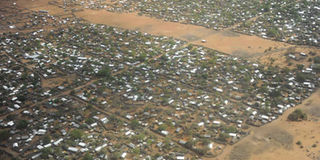Kenya's row with agencies over Somalia crisis

A general view of the Dadaab Refugee camp, where the influx of Somali's displaced by a ravaging famine remains high. Photo/AFP
A row has erupted between the Kenyan government, international aid agencies and the United Nations over the opening of an extension camp for Somalia refugees.
The Kenyan government is increasingly adamant that the flow of Somalia refugees – at around 1,500 per day – is unsustainable and wants the international community to address the humanitarian crisis within Somalia boundaries. (Read: US lauds Kenya move to host Somali refugees)
This is believed to be the reason as to why the new extension camp for Somalia refugees – known as Ifo 2 – has remained closed despite mixed reactions from the government over its accessibility.
Aid agencies say that the humanitarian situation in Somalia is ridiculous as that the existing facilities cannot cope with the overwhelming demand.
However, the Kenyan government is under pressure from a number of MPs, particularly those representing northern constituencies to disallow the development of the new permanent structure.
They are also concerned that the amenities available at Ifo 2, including schools, clinics and housing schemes are well equipped compared to those occupied by local residents.
However, the UNHCR states that Ifo 2 “is open,” and aid agencies have been asked to “move in.”
The problem facing the government is that the international community appears unwilling to act on the humanitarian crisis within the Somalia borders.
Since the early 1990s, Somalia has been a ‘no go’ zone for western policy makers despite the current famine ravaging south of the country.
There is also minimal coverage on events inside the country due to inaccessibility caused by insecurity.
This has led to influx of Somalis refugees into Kenya due to its accessibility by humanitarian organisations.
It is estimated that the refugees population at Dadaab will hit half a million people by end-year making it the third largest town in the country.
As pressure mounts for the government to allow more refugees influx, President Mwai Kibaki last week said that the present situation was “unacceptable” and insisted that Somalia refugees “be settled in their (own) country.”
A report in the Guardian acknowledged that Kenya “has historically been a generous host to refugees from neighbouring countries,” but said that the situation was changing with Kenya becoming increasingly concerned by the deteriorating situation inside Somalia “particularly the terror threat posed by al-Qaida affiliated insurgents.”




